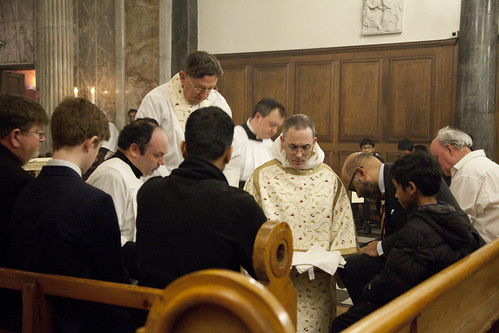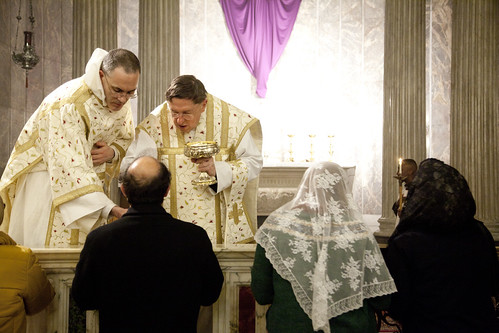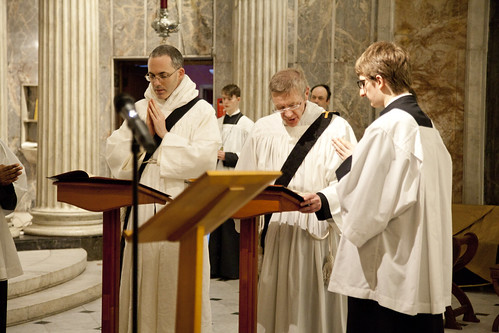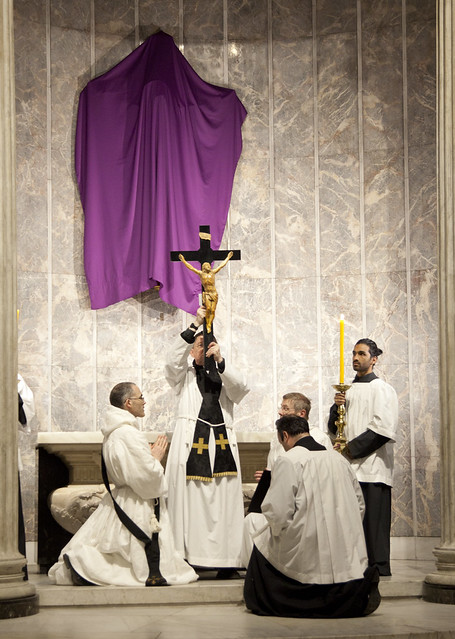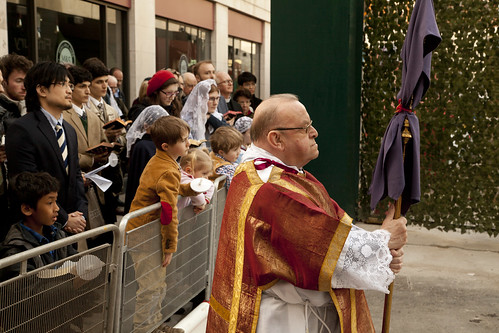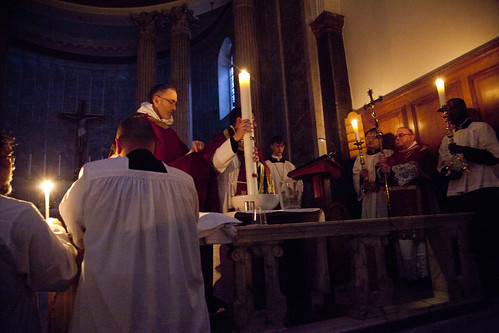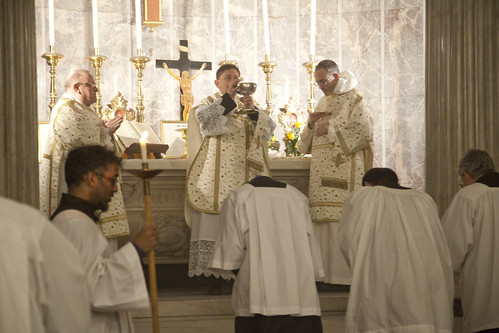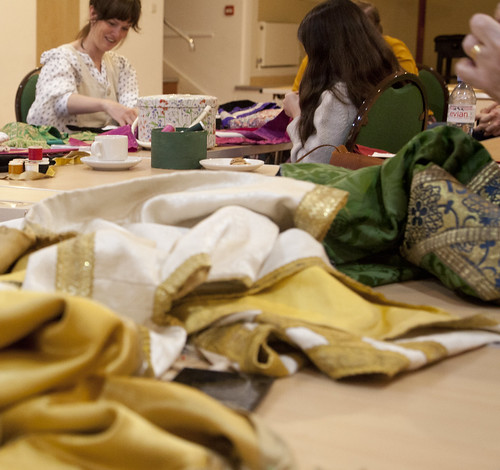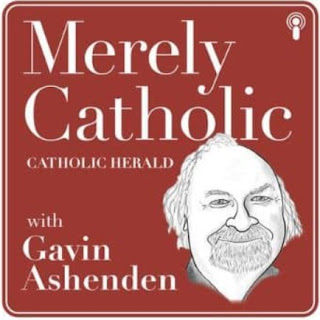Chairman's Blog
Easter Triduum Photos from St Mary Moorfields
On Good Friday: for Catholic Answers
One of the markers of the utter desolation of the Chosen People at certain points of their history was the cessation of the daily sacrifice in the Temple: when Solomon’s Temple was destroyed by the Babylonians, when its replacement was defiled by the Seleucid Empire in the time of the Maccabees, and finally when it was destroyed by the Romans in A.D. 70. The profound grief of these moments found expression in the biblical book of Jeremiah’s Lamentations.
A similar note of grief afflicts the Church in contemplating the crucifixion and death of Our Lord Jesus Christ, commemorated most solemnly on Good Friday. The Lamentations form a major element in the traditional services of Matins and Lauds celebrated over the Triduum, called Tenebrae.
We know that the story does not end there: Jesus rose again. Nevertheless, his death was real, and the grief of his mother and disciples was real. The grief of Our Lady was not based on a misunderstanding or a failure to accept God’s will. It was natural, and it was demanded by the occasion: the suffering and death of her Son. The sorrowful stage of the journey was a necessary one: Christ had to suffer through it, and Our Lady, our model, kept him company in that suffering. We must not succumb to the temptation of flipping the pages of the story too quickly to get to the happy ending.
Una Voce International: new edition of Gregorius Magnus magazine

Gregorius Magnus 15, Summer 2023, is now available as a PDF.
and on ISSUU, optimised for mobile devices.
This issue has two appreciations of Pope Benedict XVI and a report of the most recent Summorum Pontificum 'Ad Sedem Petri' Pilgrimage in Rome, and meeting of CIEL in Rome.
Would you like to advertise? Or to contribute to future editions? Click on the links.
Support the Latin Mass Society
Guild of St Clare Sponsorship Scheme for the Royal School of Needlwork
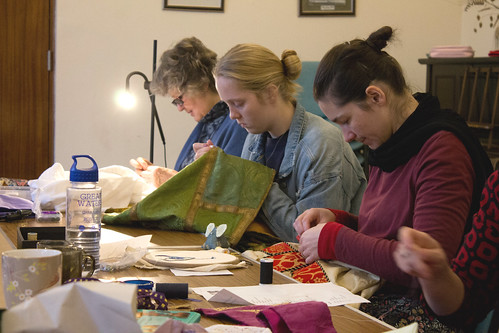 |
| At a Guild of St Clare Sewing Retreat |
Do you have a passion for hand embroidery and the restoration of fine vestments?
We are pleased to announce an exciting sponsorship opportunity for those interested in studying Needlework.
The Guild of St Clare is offering sponsorship for candidates wishing to study The Royal School of Needlework Certificate Course.
Dealine for applications is the 23rd June 2023
See HERE for more information and how to apply.
Reply to Cardinal Roche on the BBC
As I recently wrote on Catholic Answers, the confusion surrounding the meaning of Traditionis custodes, and its flotilla of supplementary documents, is beginning to resemble that around Amoris Laetitia. I was talking specifically about the purpose of the document: what vision of the ecclesial landscape inspires it. Here I want to focus on the equally opaque reasoning behind it.
Last Sunday BBC Radio 4 aired a short report on the Traditional Mass. They talked to the Catholic blogger Maria Jones (do have a look at her channel ‘One of Nine’), a priest who says the TLM, and some Traditional Mass goers they found by chance outside a church. We also heard clips from Austen Ivereigh, papal biographer, and Cardinal Arthur Roche. (Listen here, 5min to 12min.)
On the subject of why TC had been issued, Ivereigh tells us that people who attend the Traditional Mass constitute a sinister ‘movement’ opposed to Vatican II. This claim is presumably inspired by Pope Francis’ 2021 Letter to Bishops. The difficulty with it is that even the most emotional and unsophisticated supporters of the Traditional Mass that the BBC journalists could find lend absolutely no support to this idea. If the ‘movement’ Ivereigh speaks of is only found in some obscure corner of the internet, then it is hard to know why Pope Francis has caused such heartache by restricting the Traditional Mass all over the world.
Cardinal Roche, on the other hand, spoke as follows:
You know the theology of the Church has changed. Whereas before the priest represented, at a distance, all the people. They were channelled, as it were, through this person who alone was celebrating the Mass. It is not only the priest who celebrates the liturgy, but also those who are baptised with him. And that is an enormous statement to make.
This is completely unrelated to the claims made in the Letter to Bishops, and it is hard to think of such a claim being made by a Curial Cardinal before.
On the Rescript: for Catholic Answers
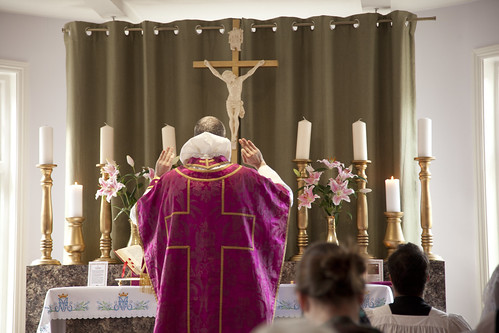 |
| Mass at the most recent Guild of St Clare Sewing Retreat |
The average Catholic may hear the term Rescriptum ex audientia and suddenly remember a number of pressing engagements he has to get to. But this term has profound and troubling implications for the faith life of everyone looking for authoritative, magisterial guidance in how best to follow and worship Our Lord.
What is the Rescriptum, or Rescript? It is a document, published on February 21, that doubles down on restricting the availability of the traditional Latin Mass (TLM). It says that bishops may not allow its celebration in parish churches without the agreement of the Dicastery for Divine Worship in Rome. Up to now, when the Dicastery has been involved in such decisions, the number of places where the TLM has been offered has fallen sharply—for example, from seven to three in the Archdiocese of Washington.
Read it all there.
Staff changes at the Latin Mass Society
 |
| The start of the Easter Vigil last year at St Mary Moorfields. Richard Picket was the Master of Ceremonies |
The Latin Mass Society Announces Staff Changes
After eight years as the Latin Mass Society’s General Manager, Stephen Moseling is retiring from this position at the end of March, 2023. The Society is very grateful for Stephen’s hard work over the years and prays that he enjoys his retirement.
The Society is pleased to announce his successor will be Richard Pickett. Richard has an in-depth knowledge of the Traditional Rites and has helped with Confirmations, the Sacred Triduum, Pontifical Masses in Westminster Cathedral and other high-profile Masses in London. In addition to this, he previously worked at Westminster Abbey and the City of London Corporation in protocol and organisational roles. Richard will start work on 1st April and the Society is delighted that it will benefit from his experience and proven administrative and managerial skills. In anticipation of starting his new job, Richard commented: “I look forward to the prospect of working for the Latin Mass Society at this important moment. Tribute is due to Stephen Moseling, who has done so much to advance the work of the society."
Stephen reflects that “It has been an honour to have been a part of the work of the Society for the past eight years. I have every confidence that Richard will take the work of the office forward and I wish the Society well for the future."
The Latin Mass Society also welcomes Portia Berry-Kilby who has taken over the role of Communications Officer from Clare Bowskill who, after seven years as the Society’s Publicist, felt the time had come for the Society to have a new perspective on the way it portrays itself on social media and in the public domain. The Society is immensely grateful to Clare for all she has done and wishes her well for the future.
Portia has an extensive background in communications, research and strategy. She is a former attaché for the Permanent Observer Mission of the Holy See to the United Nations, and currently works on international freedom of religion or belief in Westminster, which she will continue to do while working freelance for the Society.
Commenting on the recent staff changes, the Society’s Chairman Dr Joseph Shaw said: “The Latin Mass Society team has been very effective in serving the Church and getting our message across over recent years. I would like to pay particular tribute to Stephen's expansion of our on-line shop and Clare's achievement in increasing our following on social media.
“I am delighted that we have been able to fill both these important roles with excellent replacements, and I look forward to working with Richard and Portia, in the challenging circumstances that the Society currently faces.”
--
Portia Berry-Kilby
Communications Officer
Mobile: 07908569548
Letter in The Tablet: the quickest way to a parallel Church
Last week Christopher Lamb wrote a feature article in The Tablet -- in addition to his weekly column -- on the Rescript and the general question of Vatican policy towards the Traditional Mass. It contained many things I could have objected to, and overall Lamb seems lacking in seriousness. For example, in response to the careful argument made by JD Flynn -- and many other canonists -- based on the legal implications of the fact that the Responsa ad dubia from December 2021 was approved by Pope Francis in forma communi and not in forma specifica, Lamb tells us artlessly that Cardinal Roche informed him 'that the Pope approved it'. So that's settled, then.
However, I decided not to address these sorts of things and they have published (most of) a letter I sent them, which comments on the situation in a more general way. (Words cut in red.)
----------
Christopher Lamb’s article (Critical Mass, 4 March) reiterates the central mystery of the recent instructions from Rome on the Latin Mass: the idea that Catholics attached to it should be moved from parish churches to various obscure alternative places of worship, or perhaps to the chapels of the SSPX outside the structures of the Church, in order to prevent a ‘parallel Church’ developing.
I am a witness to the effect on Traditional Catholics, when restrictions were eased in 2007, of being moved into parish churches, after a long period in the wilderness. This led to their greater integration into the life of the parish and diocese, their greater sense of solidarity with the wider Church, and the undoing of the marginalisation which can breed isolation, bitterness, and radicalisation.
Reversing this process, after 13 years in which deep wounds had healed, is the high road to creating a ‘parallel Church’, where those who worship in Latin never meet their fellow Catholics and feel permanently—and, we must admit, justifiably—aggrieved by the actions of the hierarchical Church.
There are two important differences between today, and the previous time this happened, in the 1970s. One is the vastly increased numbers of Catholics who have, with the encouragement of Pope Benedict XVI, made the ancient Mass their spiritual home. The other is the much greater sympathy they receive from priests and bishops.
How this ends, I leave to readers to imagine.
Interview with Fr Robert McTeigue SJ
We welcome back Dr. Joseph Shaw of Una Voce and the Latin Mass Society of England and Wales to discuss the latest document from Rome regarding the traditional liturgy. What is the basis for shutting down traditional Masses, and why does that seem to be a top priority among those in authority?
Podcast with Gavin Ashenden
Support the Latin Mass Society


